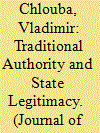| Srl | Item |
| 1 |
ID:
138858


|
|
|
|
|
| Summary/Abstract |
Traditional or indigenous politico-administrative institutions, as opposed to those of western origin, appear to be regaining their once lost allure in Africa. Yet, it is not enough to simply extol or advocate a return to tradition. There is a need to examine the implicit hypothesis of such advocacy. Are traditional institutions truly capable of making a positive contribution to ongoing efforts to promote good governance and, ultimately, development in Africa? The present study attempts to address this question by analysing the traditional system of Meta, an acephalous polity with a tradition of autonomous chiefdoms and village-centric orientation, in the Northwest Region, Cameroon. A sample of village-level initiatives undertaken within the polity’s decentralized indigenous politico-administrative framework, and region-wide development projects under the auspices of centralized modern institutional bodies, are compared. Results show the indigenous systems markedly outperforming their modern counterparts, particularly based on outcome measures of good governance. This provides some empirical justification for recommending the incorporation of traditional institutions in the modern governance process in Cameroon in particular and Africa in general.
|
|
|
|
|
|
|
|
|
|
|
|
|
|
|
|
| 2 |
ID:
174418


|
|
|
|
|
| Summary/Abstract |
Do African traditional leaders weaken state legitimacy at the local level? Past scholarship raises the possibility that unelected chiefs might undermine trust in national-level institutions. Relying on an original map of areas governed by chiefs and survey data from Namibia, this study examines whether respondents governed by traditional leaders are less likely to trust state institutions. The main finding is that compared to individuals not living under traditional authority, chiefdom residents are more likely to trust government institutions. Partially to alleviate the concern that chiefdom residence is endogenous to trust in national-level institutions, this article uses a genetic matching strategy to compare relatively similar individuals. A further finding is that the association between chiefdom residence and trust in state institutions is considerably weaker and less statistically significant for individuals who do not share ethnicity with their chief. This evidence suggests that traditional leaders’ ability to complement state institutions at the local level is compromised by ethnic diversity.
|
|
|
|
|
|
|
|
|
|
|
|
|
|
|
|